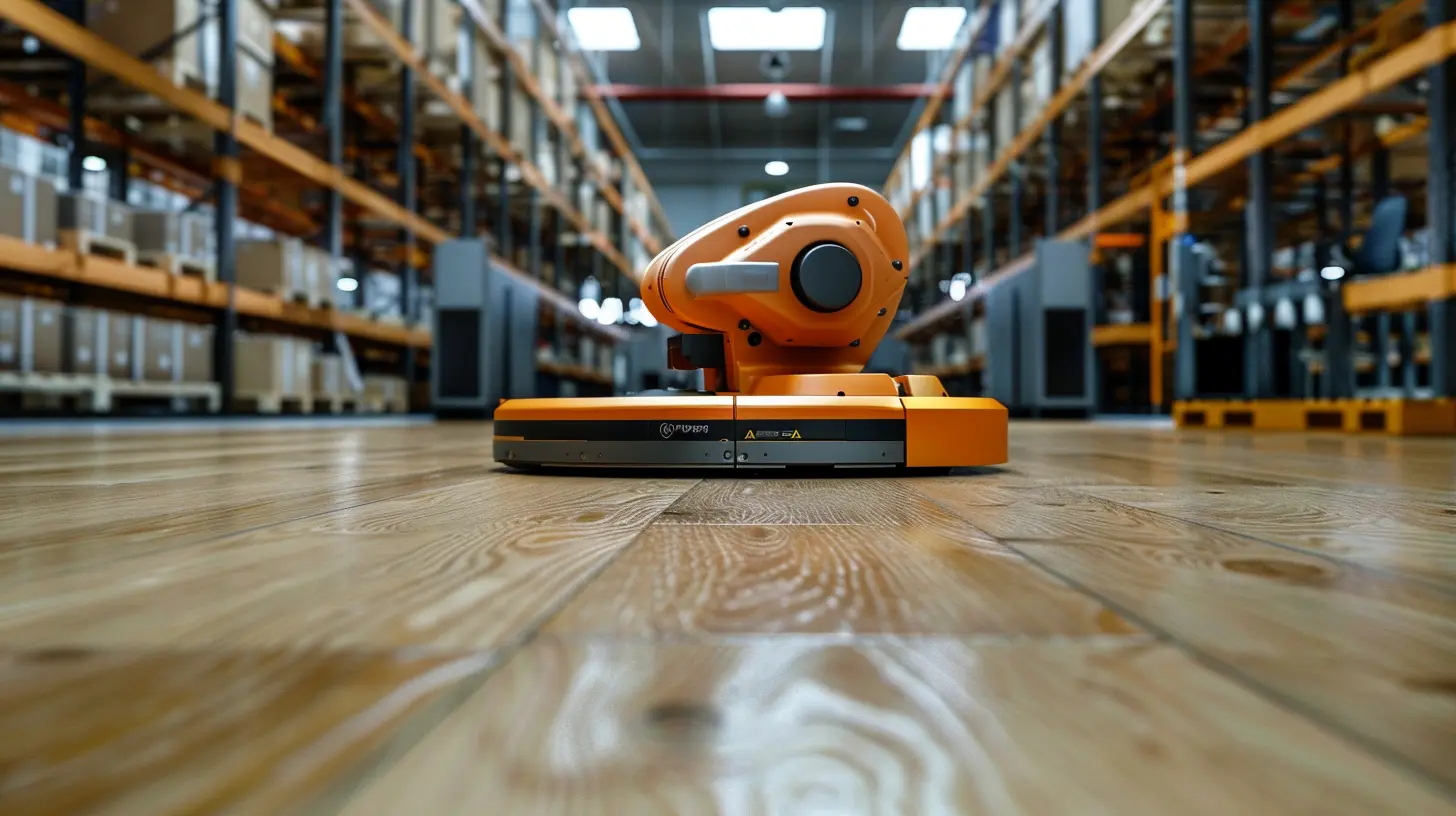Unlocking New Opportunities with Robotic Process Automation in Manufacturing
8 April 2025
In today's fast-paced world, staying competitive isn’t just about working harder—it’s about working smarter. And one area where this rings especially true is manufacturing. The landscape is evolving, and companies are constantly searching for ways to increase efficiency, reduce costs, and improve overall productivity. Enter Robotic Process Automation (RPA). If you’re not already familiar, RPA is like having a digital workforce that handles repetitive, time-consuming tasks, freeing up human hands and minds for higher-value work.
But here’s the kicker: RPA isn’t just limited to office tasks or service industries. It's diving headfirst into the manufacturing sector, revolutionizing how things get done on the factory floor. So, what’s all the buzz about? Let’s explore how RPA is unlocking new opportunities in manufacturing and why it could be the game-changer your business needs.
What Exactly Is Robotic Process Automation?
Before we dive deep into how RPA is shaking things up in manufacturing, let’s get a quick overview of what it actually is. Simply put, Robotic Process Automation refers to the technology that allows software robots—or bots—to mimic human actions in digital systems. These bots can move data between applications, trigger responses, execute tasks, and communicate with other systems. Think of them as your digital assistants.Here’s the beauty of RPA: it doesn’t require complex programming or major IT infrastructure changes. It integrates with existing systems seamlessly and can be up and running in no time. And while it might sound like robots are taking over human jobs, it’s quite the opposite. RPA actually helps humans focus on more strategic, meaningful work by automating mundane, repetitive tasks.
The Role of RPA in Manufacturing
Now, let’s flip the script to manufacturing. Traditionally, when we think of automation in manufacturing, we picture physical robots on the assembly line, right? Machines welding car parts together or packaging products at lightning speeds. But RPA is different. It’s not about physical automation—it’s about digital automation.Manufacturing operations involve a lot of data processing, inventory management, supply chain coordination, and compliance tracking. These are all areas where RPA can step in and make a difference. Imagine having a bot handle the tedious task of updating inventory levels or processing purchase orders. That’s where RPA shines.
Here’s how RPA is unlocking new opportunities in manufacturing:
1. Streamlining Supply Chain Management
Let’s face it: supply chain management can be a logistical nightmare. Coordinating suppliers, tracking shipments, and ensuring materials arrive on time requires constant attention. RPA can take over many of the repetitive tasks involved in supply chain management, such as:- Automatically updating inventory levels and placing orders when stock gets low.
- Tracking shipments and sending real-time updates to relevant departments.
- Generating and filing compliance reports.
By automating these processes, manufacturers can ensure smoother operations with fewer errors. Not to mention, RPA helps reduce the risk of human error, which can be costly in supply chain management.
2. Enhancing Quality Control
Quality control is critical in manufacturing. Every product needs to meet specific standards, and even the smallest mistake can lead to costly recalls or, worse, damage to your brand’s reputation. Traditionally, quality control involves manually inspecting products at various stages in the production line. But with RPA, manufacturers can automate data collection and analysis to identify defects in real-time.For example, RPA bots can:
- Collect data from production lines and analyze it to spot deviations from quality standards.
- Automatically flag products that don’t meet specifications for further inspection.
- Generate reports on production quality, helping management make informed decisions.
By leveraging RPA, manufacturers can catch potential issues early in the process, reducing waste and improving overall product quality.
3. Improving Data Management and Reporting
Manufacturing operations generate an enormous amount of data. From production metrics to compliance records, managing all of this information can be overwhelming. But here’s where RPA steps in to save the day.RPA bots can:
- Automatically collect data from various systems and update records in real-time.
- Generate accurate reports on production efficiency, downtime, and more—without human intervention.
- Ensure compliance with industry regulations by regularly auditing data and generating necessary reports.
With RPA, manufacturers can ensure their data is always up to date and accurate, helping them make better, data-driven decisions.
4. Boosting Production Scheduling
Production scheduling is a delicate balancing act. Manufacturers need to ensure they have the right materials, equipment, and personnel available at the right time to meet demand. But let’s be honest—this can be a challenge, especially when dealing with fluctuating customer orders.RPA can help by:
- Automatically adjusting production schedules based on real-time demand and inventory levels.
- Coordinating with suppliers to ensure materials are delivered on time.
- Sending alerts to management if there’s a risk of delays or disruptions in the schedule.
By automating production scheduling, manufacturers can respond more quickly to changes in demand, reducing lead times and improving customer satisfaction.
5. Reducing Operational Costs
One of the most significant benefits of RPA in manufacturing is its ability to cut costs. Think about it: by automating repetitive tasks, manufacturers can reduce the need for manual labor, minimize errors, and streamline operations—all of which contribute to lower operational costs.For example, RPA can:
- Handle administrative tasks, such as order processing and billing, reducing the need for office staff.
- Automate maintenance scheduling for machinery, ensuring equipment stays in peak condition and reducing downtime.
- Optimize energy usage by monitoring production lines and adjusting settings based on real-time data.
All of this adds up to significant cost savings over time, making RPA an attractive option for manufacturers looking to improve their bottom line.
Overcoming Challenges with RPA in Manufacturing
So, it’s clear that RPA offers a ton of benefits for manufacturers. But, of course, it’s not without its challenges. Like any technology, RPA comes with its own set of hurdles that manufacturers need to overcome to reap the full benefits.1. Integration with Legacy Systems
One of the biggest challenges manufacturers face when implementing RPA is integrating it with their existing legacy systems. Many manufacturing companies still rely on older software and hardware systems that weren’t designed with automation in mind. However, the good news is that RPA is designed to work with existing systems, even legacy ones. It just requires careful planning and collaboration between IT and operations teams to ensure a smooth integration.2. Change Management
Let’s be real: any time you introduce new technology, there’s going to be some resistance. Employees might be wary of RPA, fearing their jobs are at risk. This is where change management comes into play. It’s crucial for manufacturers to communicate the benefits of RPA to their workforce and emphasize that it’s not about replacing jobs—it’s about enhancing them. Training programs can help employees learn how to work alongside RPA bots, ensuring a smooth transition.3. Ensuring Scalability
Another challenge is ensuring that RPA implementations can scale as the business grows. Manufacturers need to choose RPA solutions that are flexible and adaptable. Starting with small automation projects and gradually expanding the scope can help ensure that RPA scales effectively without overwhelming the system.
The Future of RPA in Manufacturing
So, what does the future hold for RPA in manufacturing? Well, it’s only just getting started. As the technology continues to evolve, we can expect to see even more advanced applications of RPA in the manufacturing sector.For instance, combining RPA with Artificial Intelligence (AI) and Machine Learning (ML) could take automation to the next level. Imagine bots that not only execute tasks but also learn from data patterns and make intelligent decisions. AI-powered RPA could potentially revolutionize everything from predictive maintenance to demand forecasting.
Moreover, as manufacturers continue to embrace Industry 4.0 and the Internet of Things (IoT), RPA will play a crucial role in connecting digital and physical operations. The integration of smart devices, sensors, and RPA bots will create an ecosystem where data flows seamlessly, and automation becomes the backbone of manufacturing operations.
Conclusion: Embracing the RPA Revolution
There’s no doubt that Robotic Process Automation is unlocking new opportunities in manufacturing. From streamlining supply chains to improving quality control, RPA is transforming the way manufacturers operate. It’s not about replacing human workers—it’s about empowering them to focus on more valuable tasks while letting bots handle the mundane.As manufacturers continue to face increasing pressure to improve efficiency and reduce costs, RPA offers a clear path forward. By embracing this technology, companies can stay ahead of the competition and unlock new levels of productivity and growth.
So, is your manufacturing business ready to harness the power of RPA? The future is automated—and it’s knocking on your door.
all images in this post were generated using AI tools
Category:
Robotic Process AutomationAuthor:

John Peterson
Discussion
rate this article
8 comments
Valentina Myers
Robotic Process Automation (RPA) in manufacturing not only streamlines operations but also fosters innovation by freeing up human resources for strategic tasks. Embracing RPA can enhance efficiency, reduce errors, and unlock new business models, positioning companies to thrive in an increasingly competitive landscape.
May 5, 2025 at 12:53 PM

John Peterson
Thank you for your insightful comment! I completely agree that RPA is a game-changer in manufacturing, enabling both efficiency and innovation by allowing teams to focus on higher-value tasks.
Trixie McGlynn
This article beautifully highlights the transformative potential of Robotic Process Automation in manufacturing. Embracing RPA not only drives efficiency but also empowers workers to focus on innovation and creativity. Excited to see how these advancements will shape the future of the industry! Thank you for sharing!
April 29, 2025 at 3:06 AM

John Peterson
Thank you for your thoughtful comment! I'm glad you found the article insightful and share the excitement for RPA's potential in transforming manufacturing. Your support is appreciated!
Carter Brown
Robotic Process Automation in manufacturing? It’s like giving your factory a smart makeover! Time to kick inefficiencies to the curb and watch productivity soar—because who has time for manual drudgery in 2023?
April 19, 2025 at 10:20 AM

John Peterson
Absolutely! RPA is revolutionizing manufacturing by streamlining processes, boosting efficiency, and allowing teams to focus on innovation rather than tedious tasks. Exciting times ahead!
Maisie McAllister
This article brilliantly highlights how Robotic Process Automation (RPA) is revolutionizing the manufacturing sector. By streamlining processes, reducing errors, and enhancing productivity, RPA not only lowers operational costs but also unlocks new opportunities for innovation and growth. A must-read for industry leaders looking to stay competitive!
April 17, 2025 at 11:29 AM

John Peterson
Thank you for your insightful comment! I’m glad you found the article valuable in highlighting RPA's impact on manufacturing.
Diesel McMeekin
RPA revolutionizes efficiency, reducing costs and enhancing productivity in manufacturing.
April 17, 2025 at 3:32 AM

John Peterson
Thank you! I'm glad you see the transformative potential of RPA in manufacturing. It truly is a game-changer for efficiency and productivity!
Blake McCarthy
Great article! It’s fascinating how Robotic Process Automation is transforming manufacturing. The potential to streamline operations and enhance efficiency while freeing up human talent is truly a game-changer. Excited to see where this goes!
April 12, 2025 at 4:16 AM

John Peterson
Thank you! I'm glad you found it interesting. The potential of RPA in manufacturing is indeed exciting, and I'm eager to see how it continues to evolve!
Weston McNulty
RPA: Robots dancing their way to efficiency!
April 9, 2025 at 4:21 AM

John Peterson
Glad you enjoyed the metaphor! RPA truly is transforming efficiency in manufacturing—much like a well-choreographed dance.
Zorina Romero
Fascinating insights! How will RPA reshape workforce dynamics in manufacturing? I'm curious about the balance between automation efficiency and human creativity!
April 8, 2025 at 6:34 PM

John Peterson
Thank you! RPA will enhance workforce dynamics by automating repetitive tasks, allowing humans to focus on creative problem-solving and innovation. This balance can lead to increased efficiency while leveraging human skills to drive continuous improvement.
MORE POSTS

Big Data in the Cloud: Benefits and Challenges

How Big Data is Driving Innovation in the Automotive Industry

Reviewing the Top Noise-Cancelling Over-Ear Headphones for Commuters

The Best Ultrabooks for Graphic Design and Photography

Hydrogen-Powered Vehicles: The Next Leap in Sustainable Transport

The Pros and Cons of Smart Locks for Home Security